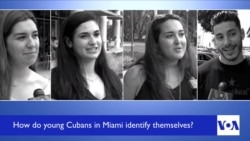Like many young Cuban-Americans in Miami, 18-year-old Stephanie Chaviano grew up speaking two languages: Spanish, at home, and English, in school.
Chaviano has spent her entire life in the United States, but presents a slight accent when she speaks English – at least that’s how it appears, she says, to anyone from out of town. Her identity, meanwhile, depends on who is asking.
Outside Florida, Chaviano might give the whole spiel: “Well, I'm Cuban, but I was born here in America.”
But in Miami, she’s “more Cuban.”
Chaviano represents the new face of Cuban-Americans in the United States. In 2013, 43 percent of the Cuban population was born in the United States, compared with only 32 percent in 2000, according to the Pew Research Center.
The average age for Cuban-Americans born in the U.S. is 22, the prime voting age.
As the Cuban-American demographics change, so do views of Cuba.
In fact, President Barack Obama's change in policy toward Cuba comes as the Cuban-American population itself is changing – in its demographics, views of U.S.-Cuba policy and its politics.
Leaning Democratic
As a first-generation American, Chaviano is politically less conservative than her parents, but still moderate.
"I see and understand other sides to the arguments,” she said. “My mom’s like, 'no, no,' and I say, 'Mom, this isn’t Cuba. You have to understand things are different here. Different possibilities, different situations.' "
Along with the change in demographics, Cuban-Americans in the United States are shifting in favor of Democratic causes on a number of issues. They narrowly supported Obama by a 2 percent margin in 2012 – a move to the left from decades past.
Jorge Duany, director of the Cuban Research Institute at Florida International University (FIU), said young Cubans in particular tend to register as Democrats or Independents, sharing similar positions with the overall Latino electorate on issues such as gay marriage, social security, medicare and bilingual education.
However, Duany said Cuban-American youth are the exception on foreign policy.
“They still in many ways follow their parents' and grandparents' preferences regarding U.S. policy toward Cuba,” he said, “so they are more conservative in general than other Latinos in the U.S.”
'Difference in passion'
José Azel, senior researcher at the Institute for Cuban and Cuban-American Studies (ICCAS) at the University of Miami, said the issue of a generational shift in politics is often misconstrued in the media.
“There is a difference in passion, but not necessarily in opinion,” said Azel, referring to young Cuban-Americans.
He argued that the shift in political correlation is greater with regard to “time of departure from Cuba,” rather than age.
Recently arrived Cuban-American immigrants -- from 1990 to the present -- tend to favor engagement with the communist island and are more likely to send remittances to family and friends, compared with the immigration wave of the 1960s, that often views such acts as supportive of the Castro regime, Duany said.
Overall, a 2014 poll conducted by FIU found that 52 percent of Cuban-American adults in Miami-Dade County, Florida -- home to the largest Cuban community in the U.S. -- support lifting the U.S. embargo, compared with just 13 percent in 1991. Among 18- to 29-year-olds, support rises to 62 percent.
Diverse community, opinions
There is great variation within each wave of immigrants, Duany points out. Generation, age, social class and geography are all important factors, he said.
Ana María Socarras, who arrived in Miami just two months ago, is one such exception.
Born and raised in Havana, Socarras is a lover of art history and a self-identified conservative.
In Cuba, she said she was unable to fulfill her dream of creating an art gallery of her own. Freedom of speech and opportunities do not exist, she said.
Socarras acknowledged that she strays politically from other recently arrived immigrants, in part because she does not plan on returning to Cuba.
“Anytime you go to Cuba, they give money to the government,” she said. “And in a way, that validates the government, and I don’t want to help anymore.”
Others, such as 27-year-old Cuban-American Anisbel López, who is from Camagüey, Cuba, argued that it’s time to try a new approach.
“I just feel like nothing has changed with the ways things have been for 50 years, so why not open them up?” Lopez said.
“We talk so much about world peace and bringing everybody together. Then why have this battle with a country that's so close to us, with so many Cubans living in Miami?” she asked.













